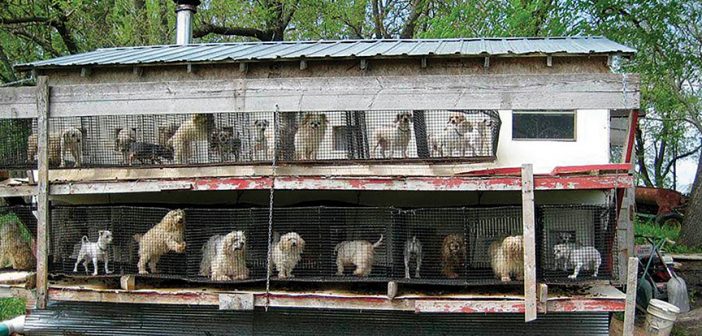by Temma Martin
As an organization whose mission is to end the killing of pets in shelters, of course Best Friends Animal Society encourages people looking for a pet to adopt from a shelter or rescue group, rather than buying from a pet store, breeder or online retailer.
But for those who do choose to buy from a pet store or online puppy seller, a newly published paper shares the increased emotional and behavioral problems in dogs from commercial breeders. Add to this a change to the USDA website and it adds up to an even greater case of “buyer beware.”
The paper, by veterinarian Dr. Franklin D. McMillan, director of well-being studies for Best Friends Animal Society, was published in the latest online issue of the Journal of Veterinary Behavior: Clinical Applications and Research.
The paper reviews the findings of multiple studies involving dogs born in high-volume commercial breeding establishments – commonly known as puppy mills – and sold to the consumer directly via the Internet, or indirectly through retail pet stores. Conducted in Italy, Australia, the United Kingdom, and the United States, all of the studies found that upon adulthood, the puppies from these high-volume breeding facilities were more likely to show behavioral and emotional problems that cause distress, when compared with dogs from other sources, especially those from non-commercial breeders.
The most consistent finding among the studies is an increase in aggression most commonly directed toward the dogs’ owners and family members but also to unfamiliar people and other dogs. The dogs also showed higher levels of fear toward unfamiliar people, children, other dogs and when taken on walks. In addition, they tended to show undesirable behaviors related to being left alone at home, excessive attention-seeking and a decreased tolerance to being touched or held.
Because of how dogs sold through pet stores and/or born in puppy mills are bred, housed, handled, shipped, homed, and raised, there are many possible reasons underlying the problems they show as adults. Genetics may play a role, but stress during the development of the puppy’s brain appears to be the most likely explanation for the abnormal behaviors in adulthood. A 2011 study by Best Friends Animal Society on adult breeding dogs removed from puppy mills, published in the journal Applied Animal Behaviour Science, provided the first scientific evidence that these high-volume breeding operations cause dogs major psychological harm.
The release of this information is timely, as it coincides with the recent removal of a searchable database from the USDA website, which previously made available – among many other types of data – inspection reports that offered at least some transparency about the inspections performed at facilities like commercial puppy breeders.
The disabling of the database represents the removal of an important tool that allowed consumers who choose to buy from a pet store or online retailer to research necessary information about where the puppy came from, before making a significant financial and emotional investment.
Puppy mills are high-volume dog breeding facilities, like “factory farms,” where dogs live in small cages, often in the minimum legal size allowed (only six inches larger than the dog on all sides) and female dogs are bred as frequently as possible. Most puppy mill dogs have inadequate medical care and human socialization. They live in these tiny cages for their entire lives, and most have never walked on solid ground. Many legal, licensed breeders own 1,000 or more dogs.
These operations churn out an estimated two million puppies and supply nearly 100 percent of the puppies for pet stores and online puppy retailers. There are an estimated 10,000 licensed and unlicensed high-volume breeding facilities in the United States, with thousands more worldwide.
Although the federal government regulates most breeders who sell puppies online and to pet stores, the minimal standards imposed on breeders don’t promote responsible breeding or ensure healthy puppies.
 Individuals can join Best Friends Animal Society in putting an end to large-scale breeding operations:
Individuals can join Best Friends Animal Society in putting an end to large-scale breeding operations:
• Don’t buy dogs from pet stores or on the Internet.
• Please adopt from a shelter or rescue group instead.
• Spread the word: teach others about puppy mills.
Nearly 5,500 animals are killed in U.S. shelters every day, simply because they don’t have homes. When you adopt, you’re not only refusing to support puppy mills, you’re saving a life and giving an animal in need the second chance he or she deserves.
If you’re looking for a healthy, loving pet, you’re in luck. Many can readily be found in shelters and rescue groups around the country. It is estimated that at least 25 percent of dogs looking for homes through shelters and rescue groups are purebred.
Temma Martin is a public relations specialist for Best Friends Animal Society, a national animal welfare organization dedicated exclusively to ending the killing of dogs and cats in America’s shelters. Best Friends runs the nation’s largest no-kill sanctuary for companion animals, as well as programs in partnership with rescue groups and shelters.
(Photos provided by Best Friends Animal Society)




